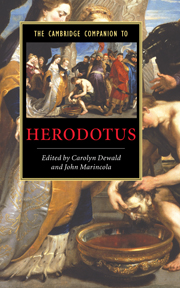Book contents
- Frontmatter
- Introduction
- 1 Herodotus and the poetry of the past
- 2 Herodotus and his prose predecessors
- 3 Herodotus and tragedy
- 4 The intellectual milieu of Herodotus
- 5 Meta-historiē: Method and genre in the Histories
- 6 The syntax of historiē: How Herodotus writes
- 7 Speech and narrative in the Histories
- 8 Herodotus, Sophocles and the woman who wanted her brother saved
- 9 Stories and storytelling in the Histories
- 10 Humour and danger in Herodotus
- 11 Location and dislocation in Herodotus
- 12 Herodotus and the natural world
- 13 Herodotus and Greek religion
- 14 Warfare in Herodotus
- 15 Herodotus, political history and political thought
- 16 Herodotus and the cities of mainland Greece
- 17 An alternate world: Herodotus and Italy
- 18 Herodotus and Persia
- 19 Herodotus and foreign lands
- 20 Herodotus' influence in antiquity
- Glossary
- Timeline
- Bibliography
- Index
- Series List
3 - Herodotus and tragedy
Published online by Cambridge University Press: 28 January 2007
- Frontmatter
- Introduction
- 1 Herodotus and the poetry of the past
- 2 Herodotus and his prose predecessors
- 3 Herodotus and tragedy
- 4 The intellectual milieu of Herodotus
- 5 Meta-historiē: Method and genre in the Histories
- 6 The syntax of historiē: How Herodotus writes
- 7 Speech and narrative in the Histories
- 8 Herodotus, Sophocles and the woman who wanted her brother saved
- 9 Stories and storytelling in the Histories
- 10 Humour and danger in Herodotus
- 11 Location and dislocation in Herodotus
- 12 Herodotus and the natural world
- 13 Herodotus and Greek religion
- 14 Warfare in Herodotus
- 15 Herodotus, political history and political thought
- 16 Herodotus and the cities of mainland Greece
- 17 An alternate world: Herodotus and Italy
- 18 Herodotus and Persia
- 19 Herodotus and foreign lands
- 20 Herodotus' influence in antiquity
- Glossary
- Timeline
- Bibliography
- Index
- Series List
Summary
The ancient biographical tradition tells us that Herodotus spent time in Athens, and he was accused by some later Greeks of undue partiality to the Athenians. He is described as especially a friend of Sophocles, who addressed to him, about 445-440 BCE, a poem of which a fragment survives. Certain passages in Sophocles' extant work are clearly related to passages in Herodotus, and it seems certain that it was the tragedian who drew on the historian, not the reverse.
It has been thought that it was his stay in Attica that made Herodotus into an historian, not a mere chronicler or antiquarian, and that the impact of tragedy was responsible for the moral interest of his work: 'Athens was his Damascus'. He appears to emerge suddenly from a much less developed and sophisticated tradition of historical writing. 'Herodotus is an unaccountable phenomenon in the history of literature', says the perceptive Denniston; 'he is in the direct line of succession to the logographers [early historical writers such as Hecataeus and Hellanicus]; but while they, apparently, had no technique at all, he had a technique at once effortless and adequate to any demands he chose to make upon it'. Nor is it simply a matter of style in the sense of arrangement of words, masterly as Herodotus is in that art, but of his conception and his scope.
- Type
- Chapter
- Information
- The Cambridge Companion to Herodotus , pp. 46 - 59Publisher: Cambridge University PressPrint publication year: 2006
- 16
- Cited by

